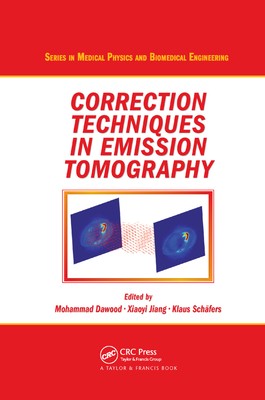
- We will send in 10–14 business days.
- Publisher: CRC Press
- ISBN-10: 0367381443
- ISBN-13: 9780367381448
- Format: 15.5 x 23.1 x 1.8 cm, softcover
- Language: English
- SAVE -10% with code: EXTRA
Correction Techniques in Emission Tomography (e-book) (used book) | bookbook.eu
Reviews
Description
Written by an interdisciplinary team of medical doctors, computer scientists, physicists, engineers, and mathematicians, Correction Techniques in Emission Tomography presents various correction methods used in emission tomography to generate and enhance images. It discusses the techniques from a computer science, mathematics, and physics viewpoint.
The book gives a comprehensive overview of correction techniques at different levels of the data processing workflow. It covers nuclear medicine imaging, hybrid emission tomography (PET-CT, SPECT-CT, PET-MRI, PET-ultrasound), and optical imaging (fluorescence molecular tomography). It illustrates basic principles as well as recent advances, such as model-based iterative algorithms and 4D methods. An important aspect of the book is on new and sophisticated motion correction techniques in PET imaging. These techniques enable high-resolution, high-quality images, leading to better imaging analysis and image-based diagnostics.
Reflecting state-of-the-art research, this volume explores the range of problems that occur in emission tomography. It looks at how the resulting images are affected and presents practical compensation methods to overcome the problems and improve the images.
EXTRA 10 % discount with code: EXTRA
The promotion ends in 16d.15:28:16
The discount code is valid when purchasing from 10 €. Discounts do not stack.
- Publisher: CRC Press
- ISBN-10: 0367381443
- ISBN-13: 9780367381448
- Format: 15.5 x 23.1 x 1.8 cm, softcover
- Language: English English
Written by an interdisciplinary team of medical doctors, computer scientists, physicists, engineers, and mathematicians, Correction Techniques in Emission Tomography presents various correction methods used in emission tomography to generate and enhance images. It discusses the techniques from a computer science, mathematics, and physics viewpoint.
The book gives a comprehensive overview of correction techniques at different levels of the data processing workflow. It covers nuclear medicine imaging, hybrid emission tomography (PET-CT, SPECT-CT, PET-MRI, PET-ultrasound), and optical imaging (fluorescence molecular tomography). It illustrates basic principles as well as recent advances, such as model-based iterative algorithms and 4D methods. An important aspect of the book is on new and sophisticated motion correction techniques in PET imaging. These techniques enable high-resolution, high-quality images, leading to better imaging analysis and image-based diagnostics.
Reflecting state-of-the-art research, this volume explores the range of problems that occur in emission tomography. It looks at how the resulting images are affected and presents practical compensation methods to overcome the problems and improve the images.


Reviews